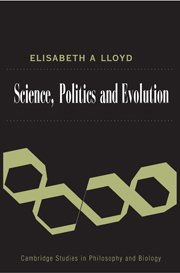Book contents
- Frontmatter
- Contents
- 1 The Nature of Darwin's Support for the Theory of Natural Selection
- 2 A Semantic Approach to the Structure of Population Genetics
- 3 Confirmation of Ecological and Evolutionary Models
- 4 Units and Levels of Selection
- 5 Species Selections on Variability
- 6 An Open Letter to Elliott Sober and David Sloan Wilson, Regarding Their Book, Unto Others: The Evolution and Psychology of Unselfish Behavior
- 7 Problems with Pluralism
- 8 Normality and Variation: The Human Genome Project and the Ideal Human Type
- 9 Evolutionary Psychology: The Burdens of Proof
- 10 Objectivity and the Double Standard for Feminist Epistemologies
- 11 Science and Anti-Science: Objectivity and Its Real Enemies
- 12 Pre-Theoretical Assumptions in Evolutionary Explanations of Female Sexuality
- References
- Index
7 - Problems with Pluralism
Published online by Cambridge University Press: 27 February 2010
- Frontmatter
- Contents
- 1 The Nature of Darwin's Support for the Theory of Natural Selection
- 2 A Semantic Approach to the Structure of Population Genetics
- 3 Confirmation of Ecological and Evolutionary Models
- 4 Units and Levels of Selection
- 5 Species Selections on Variability
- 6 An Open Letter to Elliott Sober and David Sloan Wilson, Regarding Their Book, Unto Others: The Evolution and Psychology of Unselfish Behavior
- 7 Problems with Pluralism
- 8 Normality and Variation: The Human Genome Project and the Ideal Human Type
- 9 Evolutionary Psychology: The Burdens of Proof
- 10 Objectivity and the Double Standard for Feminist Epistemologies
- 11 Science and Anti-Science: Objectivity and Its Real Enemies
- 12 Pre-Theoretical Assumptions in Evolutionary Explanations of Female Sexuality
- References
- Index
Summary
SURPRISING ANNOUNCEMENTS
From the 1960s through the early 1990s, substantive and far-reaching changes in population genetics occurred. The debates concern the units of selection, and changed the nature and scope of evolutionary explanations, turning attention from genotypic models to models of structured populations. Furthermore, the relation of a trait to its environment was explored in both models and empirical investigations. For example, Maynard Smith's early theoretical work on group selection provoked theoretical debate, whereas Michael Wade and colleagues produced empirical evidence for the efficacy of group selection as an evolutionary component. Wade's (1978) paper, in particular, criticized ill-conceived, oversold, and rigid theoretical requirements for the efficacy of group selection in nature. The result was a blossoming in a corner of population biology – both in theoretical genetics and empirical studies – of investigations into the possibility of higher-level interactors such as those that had been found in the house mouse by Lewontin and Dunn (1960, 1962) (reviewed in Section 4; for detailed analysis of structured population models, see Lloyd 1988/1994). Various attempts had been made to expand population genetics beyond the organismically focused efforts of the pre-1960s, but the work of the 1980s is distinguished by its achievement of consensus about many fundamentals of hierarchical population genetics and by its empirical substantiation of these ideas. Philosophers of biology soon joined the revolution, sorting out the various disputes and definitions, analyzing the variety of evolutionary models, focusing in on what they saw as the key issue of contention: how could the various methods and principles be used for sorting out the key “units of selection” – the objects directly involved in selection processes determining the success of genes, thus engaging in “the interactor debates.”
- Type
- Chapter
- Information
- Science, Politics, and Evolution , pp. 106 - 132Publisher: Cambridge University PressPrint publication year: 2008



